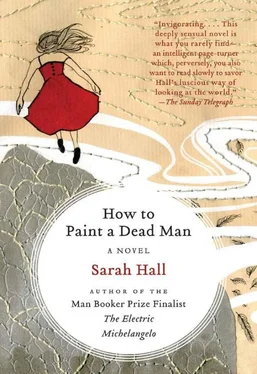Sarah Hall - How to Paint a Dead Man
Здесь есть возможность читать онлайн «Sarah Hall - How to Paint a Dead Man» весь текст электронной книги совершенно бесплатно (целиком полную версию без сокращений). В некоторых случаях можно слушать аудио, скачать через торрент в формате fb2 и присутствует краткое содержание. Год выпуска: 2009, Издательство: Harper Perennial, Жанр: Современная проза, на английском языке. Описание произведения, (предисловие) а так же отзывы посетителей доступны на портале библиотеки ЛибКат.
- Название:How to Paint a Dead Man
- Автор:
- Издательство:Harper Perennial
- Жанр:
- Год:2009
- ISBN:нет данных
- Рейтинг книги:4 / 5. Голосов: 1
-
Избранное:Добавить в избранное
- Отзывы:
-
Ваша оценка:
- 80
- 1
- 2
- 3
- 4
- 5
How to Paint a Dead Man: краткое содержание, описание и аннотация
Предлагаем к чтению аннотацию, описание, краткое содержание или предисловие (зависит от того, что написал сам автор книги «How to Paint a Dead Man»). Если вы не нашли необходимую информацию о книге — напишите в комментариях, мы постараемся отыскать её.
, Sarah Hall, "one of the most significant and exciting of Britain's young novelists" (
), delivers "a maddeningly enticing read... an amazing feat of literary engineering" (
).
How to Paint a Dead Man — читать онлайн бесплатно полную книгу (весь текст) целиком
Ниже представлен текст книги, разбитый по страницам. Система сохранения места последней прочитанной страницы, позволяет с удобством читать онлайн бесплатно книгу «How to Paint a Dead Man», без необходимости каждый раз заново искать на чём Вы остановились. Поставьте закладку, и сможете в любой момент перейти на страницу, на которой закончили чтение.
Интервал:
Закладка:
A man lingers beside her stall and asks the price of the white roses. He moves on without purchasing any, leaving only the drift of cologne. She can tell from the slowing of shoes and the speeding of shoes how people react to her prospect; who is interested in posies, and who only has money for the evening’s meal. Like the other vendors she could call out, solicitous, inviting, and say that so many of the flowers at her feet are useful; that marigold is Roman saffron-each perfect golden bowl holding seasoning and dye enough for rice, cake and marzipan. That plum blossom can be made into tea. That rose petals dissolve so delicately on the tongue and can flavour gelato. But she does not call out.
In the school nearby a bell sounds. The Montessori children skitter up the steps like calves on a ramp. Her youngest brother is among them, learning to read, learning to write. How will they learn today, she wonders? Will it be a song, or a game of some description? What will Tommaso come home reciting and will their mother approve of his advancement or think it frivolous? She remembers when she attended school. She remembers Signora Russo, who was the headmistress, and Signor Giorgio, who visited the class and taught them to paint and was always kind to her.
There are casual heel-clicks making their way through the stalls, pausing at the cheese counter with its loamy globes, at the bead-maker, and at the bric-a-brac. A little distance away, footsteps follow, cautious, flat-soled. A lady is being followed by a shy admirer. He does not have the courage to approach her. The woman passes by; she has browsed, and made a purchase, and the package creaks inside her straw bag. There is the tonk of bottles. She has wine. They could share it at a table and talk to each other of how long they have wanted to meet. Annette reaches down and lifts a stem gently with two fingers under the petal bonnet. He approaches. She holds out the rose and it is taken from her hands, humbly, wordlessly, as if taken by a spectre. Now he begins to walk quickly, and now he runs. There is a small cry of surprise, and delight, and laughter. The footsteps together disappear.
In the late morning it thunders. Rain patters on the awning, plops into the puddles by her feet. It is like the sound Tommaso has learned to make with his lips, which irritates their mother. Annette pulls the buckets of flowers close under the shelter, rolls down the canvas sides. Uncle Marcello once told her in the greenhouses that when it thunders myrtle has been axed in half, and is protesting. When the sun comes out it is because two myrtle strips have been brought back together again. He is full of such lore. Her mother often thinks it inappropriate, and a contradiction to the supreme laws of God, but she is also very superstitious. She is superstitious about salt and numbers and animals. She does and does not approve of the little spirit-stopper Uncle Marcello has made for Annette to wear around her neck. Inside the pretty green vial there is concentration of rosemary. Rosemary: strongest of the charms against demons, holiest of the aromatics.
The Mirror Crisis
You’ve been trying to cope, for the sake of your parents. For the sake of your involuntary breath, and your heart, which bangs on without consent. To all intents and purposes, and to all appearances, you are functioning adequately. You get up in the morning, wash yourself, walk to the gallery, and work. You are not lying in your own faeces, howling at strangers in the street. You are accepting things. You even bought a book on bereavement. You found yourself in the self-help section of Waterstone’s last week, pulling a pale pink volume off the shelf. The next thing you knew the salesgirl was running it through the till, taking your card, asking you to check the amount and type in your PIN. Maybe you thought this would provide the key to recovery. Maybe you thought it would give you a step-by-step approach to grieving, a register delicate enough to describe the qualities of your grief. It wasn’t much use. None of it rang true. None of it made sense. The words passed in front of your eyes and failed to describe your position. So you got rid of it-gave it away to the Oxfam on the heath. What were you thinking? That you could study death as if it was a pregnancy, or a carpentry course? That you could find the ‘lost fraternal twin’ chapter and make notes in the margin? That it would actually help?
You want to be helped. You want to experience your life. You want to feel yourself again; the owner not just of muscles, connective tissues, nerve endings and senses, but of a soul, and a familiar personality. You want to feel inhabited. In lieu of this you’ll take any transaction: pain, discomfort, cold, upset anything. You’ve been trying to jumpstart your atoms; shock them into life again. It’s what they do in hospitals after all-the gelid paddles on the chest, and then lightning shot into the unresponsive core. You’ve pinched your skin red. You’ve skipped meals, whole days without food, until you are starving. Only then would you eat; blue cheese, raw fish: anything with a strong taste. You’ve begun to eat meat again after a decade of being vegetarian. You eat it rare, savouring the wet iron on your tongue. Venison. Liver. In the grocery store your eye lingers over the stocky red slabs, bound with rind, vacuum-packed in white trays. When you arrive home, there they are at the bottom of your shopping bag, weeping pinkly against the plastic pane.
You’ve tried to provoke emotion. You’ve said cruel things to people you know-Angela, your colleague at work, and your partner Nathan-as if wanting a fight. You’ve seen the startled looks on their faces. Their expressions turning to pity. They hug you, and apologise, as if responsible for your outburst, as if excusing your behaviour. You’re hurting, aren’t you, they say. You’re missing him.
You were offered time off from the gallery after the accident, which was kind of Angela, but you haven’t taken it. Instead you’ve been erratic, not turning up, or giving short notice for impromptu trips back up north. And you’ve let your photography slide too: lucrative commissions remain unfinished, your Leica and the pricey digital sit in the kit bag in the spare room; you’ve lost money on the unused studio, and your films are tucked away at the back of the refrigerator behind the butter and bacon. There is enough art-world gossip for people to know what has occurred to your family, for them to extend consideration. Recently, Nathan told you that you’d woken up in the night crying, and hitting him, but you didn’t remember doing it. The patience granted in the wake of Danny’s death has been nothing if not remarkable.
You don’t deserve it. You’ve behaved worse than this. You’ve found that there is something that can make you feel, and make you feel present: sex. Not the routine, dusk-and-dawn sex of a trusted, established relationship, but illicit, dangerous sex. Sex that is novel and leaves you sore; that is experienced in the gaps between your mundane, moral life; that is strange and breathless and addictive.
You have been seeing someone else. You’ve discovered this man is capable of creating that hot primary yearning from the cervix down. There have been several indiscretions to date. You want there to be more. You want the skin and the smell and the taste and the movement of him. His beautiful mouth, his top lip shaped like a bird in flight. The anise of his fluids. Him made hard and pushed inside you. You understand the risks, the damages, but they seem irrelevant. This is right for you; he lets you remember what it is to be human.
You and your partner Nathan have been together for six years. There are days you are sure you love him, and days you are indifferent towards him. Oddly, the moments of desire you have experienced with this other man are the moments in which you feel the most tenderness and compassion towards Nathan. As if only by hurting him do you make him relevant.
Читать дальшеИнтервал:
Закладка:
Похожие книги на «How to Paint a Dead Man»
Представляем Вашему вниманию похожие книги на «How to Paint a Dead Man» списком для выбора. Мы отобрали схожую по названию и смыслу литературу в надежде предоставить читателям больше вариантов отыскать новые, интересные, ещё непрочитанные произведения.
Обсуждение, отзывы о книге «How to Paint a Dead Man» и просто собственные мнения читателей. Оставьте ваши комментарии, напишите, что Вы думаете о произведении, его смысле или главных героях. Укажите что конкретно понравилось, а что нет, и почему Вы так считаете.












